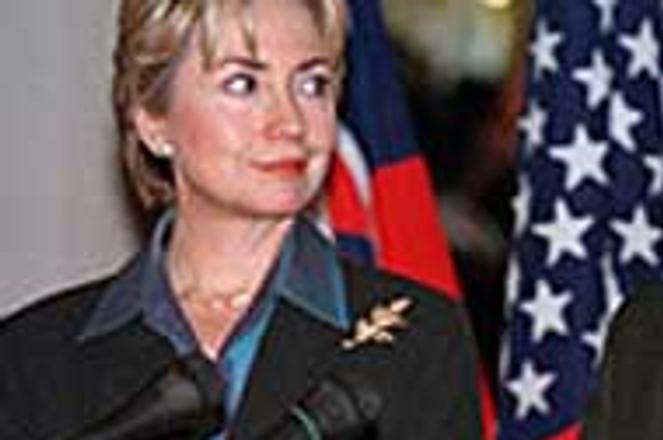US First Lady Hillary Clinton visited Slovakia during the afternoon of October 4. She expressed her support for the current government.photo: TASR
The current state of Slovak politics may not be perfect, but you wouldn't know it to hear US First Lady Hillary Clinton. During her brief visit to Slovakia October 4, she lavished praise on non-governmental organisation leaders for helping bring radical change in the 1998 parliamentary election, a result which she cited as "an example to other countries in the region and in the world."
Clinton devoted the bulk of her remarks during the hour-long meeting to praising the rise of Slovak NGOs since her last visit to the country in 1996. Though the name of former Prime Minister Vladimír Mečiar was not mentioned directly, her strong critique of his government's policies was clear.
"The last elections ratified and confirmed the values of democracy," she said. "Three years ago, I was well educated by many NGOs about the struggles they faced in the work they were doing and the pressures imposed. It is amazing to think how different things were just three years ago... when some people were speaking with the full knowledge that they could be persecuted for their statments... The risks you took were ones you felt were worth taking on behalf of democracy," she said.
In the face of all the praise, the Slovak NGO leaders kept relatively quiet about continuing problems with their funding and treatment by the current government. The US was thanked for its financial and moral support, and many NGO leaders pledged they would begin or continue to help other, less developed civil societies in the region.
"Thank you for what you did to encourage us to fight," Juraj Mesík of the Ektopolis Environmental Partnership told Clinton. "Your visit three years ago was very important to us. Today the time of fighting is hopefully behind us. Now we can focus on building our community."
The NGO discussion, which took place after private meetings with Slovak President Rudolf Schuster and Prime Minister Mikulaš Dzurinda, was chaired by Slovak Ambassador to the US Martin Bútora, and was attended by 18 NGO leaders invited by the US Embassy. The purpose of the meeting was to inform Clinton of the current activites of the NGO sector.
One group singled out for praise was the OK '98 campaign, which went door-to-door through much of Slovakia last year to encourage Slovaks to vote on election day. To recognise the 84% voter turnout that movement precipitated, Clinton asked all those in the room who had taken part in the work to stand up.
Polls today show that public support of the current SDK government party has fallen to about 20%, and real change in terms of decentralisation and involving NGOs in government decisions is moving slowly. But while groups said they needed more funding for think tanks, education and the like, talk of major problems remained general.
"The most important things we must improve now are the transparency of government, the education of citizens, and decentralisation," said Andre Bartosiewitz of the Association for the Support of Local Democracies. "We are trying to make the people aware this is their country. It is not the government vs. the citizens, but the government working for the citizens," he said.


